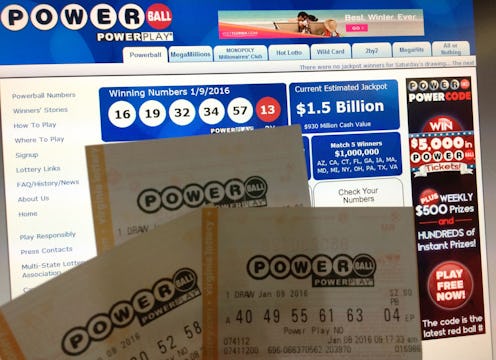News
Do Powerball Numbers Have To Be In Order?
The payout of America’s biggest lottery, the Powerball, has hit 10 figures, so it’s now possible for a $2 ticket to become worth $1.5 billion if the right numbers are drawn. The basics of the Powerball are simple: Pick six numbers, watch the Powerball people pull six numbers out of a drum, and hope that your numbers match theirs. But there’s still a lot of confusion about how the drawing works. For example, do Powerball numbers have to be drawn in order?
UPDATE: This post was originally published in January 2016. As of Aug. 23, 2017, the new Powerball jackpot has hit $700 million (and if there are no winners, it'll go to $1 billion). The Powerball will be drawn at 10:59 p.m. EST.
EARLIER: Surprisingly, they don’t. The official Powerball website, which looks like a relic from 1996, details the nine different ways to win a Powerball prize, and none of them require players to match the actual order of the numbers that are drawn. Just selecting the same numbers, or a subset of them, is sufficient.
The next Powerball will be drawn Wednesday. Naturally, with the jackpot having blown past the billion dollar mark, some people are wondering if it’s now rational, from a statistical standpoint, to invest in a $2 ticket. Writing at The Federalist, Sean Davis crunched the numbers and determined that no, it still isn’t. Given the probability of winning and the number of people who play, the maximum expected payout for any given Powerball ticket is $1.12. Close, but no cigar.
However, that may soon change. The amount of money that a Powerball winner takes home depends on whether they choose to accept their prize in one lump sum cash sum — obviously an appealing option — or in annual payments over the course of three decades. The latter option is more profitable, and it’s what the current $1.5 billion payout is based on. Choose the lump sum, and you “only” get $930 million.
Once the cash payout reaches $1.5 billion, however, a $2 ticket will result in an average prize of $2.01, assuming the number of tickets bought stays constant, at around 500 million. This would finally make buying a Powerball ticket a mathematically-sound decision, though only barely. The maximum payout from a winning ticket rises every time there’s a drawing with no winner, so it’s conceivable that we could reach this point soon.
Of course, most people aren’t thinking this way when they buy a lottery ticket. For many of us, the possibility of becoming a billionaire overnight with a measly $2 investment is too tantalizing an opportunity to pass up, no matter what the odds.
